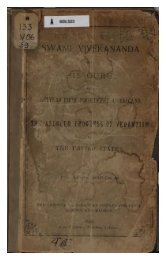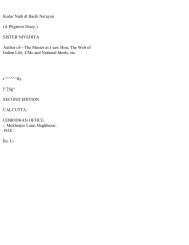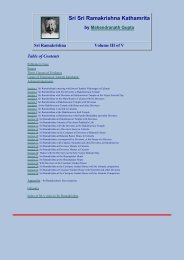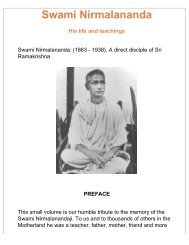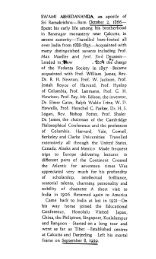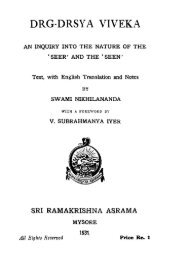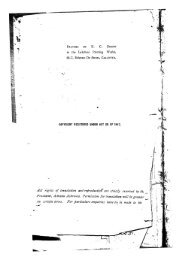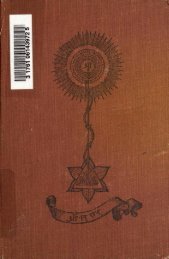Practical Vedanta
Practical Vedanta
Practical Vedanta
- No tags were found...
Create successful ePaper yourself
Turn your PDF publications into a flip-book with our unique Google optimized e-Paper software.
<strong>Practical</strong> <strong>Vedanta</strong>God is a separate entity by Him, self and man is a separate entity by himself andnature is a separate entity by itself. This is dualism, which holds that the subjectand the object are opposed to each other in everything. When man looks at nature,he is the subject and nature the object. He sees the dualism between subject andobject. When he looks at God, he sees God as object and himself as the subject.They are entirely separate. This is the dualism between man and God. This isgenerally the first view of religion.Then comes another view which I have just shown to you. Man begins to find outthat if God is the cause of the universe and the universe the effect, God Himselfmust have become the universe and the souls, and he is but a particle of whichGod is the whole. We are but little beings, sparks of that mass of fire, and thewhole universe is a manifestation of God Himself. This is the next step. InSanskrit, it is called Vishishtâdvaita. Just as I have this body and this body coversthe soul, and the soul is in and through this body, so this whole universe of infinitesouls and nature forms, as it were, the body of God. When the period of involutioncomes, the universe becomes finer and finer, yet remains the body of God. Whenthe gross manifestation comes, then also the universe remains the body of God.Just as the human soul is the soul of the human body and minds so God is the Soulof our souls. All of you have heard this expression in every religion, "Soul of oursouls". That is what is meant by it. He, as it were, resides in them, guides them, isthe ruler of them all. In the first view, that of dualism, each one of us is anindividual, eternally separate from God and nature. In the second view, we areindividuals, but not separate from God. We are like little particles floating in onemass, and that mass is God. We are individuals but one in God. We are all in Him.We are all parts of Him, and therefore we are One. And yet between man andman, man and God there is a strict individuality, separate and yet not separate.Then comes a still finer question. The question is: Can infinity have parts? What ismeant by parts of infinity? If you reason it out, you will find that it is impossible.Infinity cannot be divided, it always remains infinite. If it could be divided, eachpart would be infinite. And there cannot be two infinites. Suppose there were, onewould limit the other, and both would be finite. Infinity can only be one,undivided. Thus the conclusion will be reached that the infinite is one and notmany, and that one Infinite Soul is reflecting itself through thousands andthousands of mirrors, appearing as so many different souls. It is the same InfiniteSoul, which is the background of the universe, that we call God. The same InfiniteSoul also is the background of the human mind which we call the human soul.file:///C|/Documents%20and%20Settings/Chitra%20Selva...oksBySwami/<strong>Practical</strong><strong>Vedanta</strong>/<strong>Practical</strong><strong>Vedanta</strong>PDF.html (82 of 113)2/26/2007 12:24:34 AM



